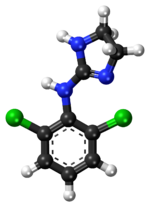Clonidine
 |
|
 |
|
| Clinical data | |
|---|---|
| Pronunciation | /ˈklɒnədiːn/ |
| Trade names | Catapres, Kapvay, Nexiclon |
| AHFS/Drugs.com | Monograph |
| MedlinePlus | a682243 |
| License data | |
| Pregnancy category |
|
| Routes of administration |
By mouth, epidural, IV, transdermal, topical |
| ATC code | |
| Legal status | |
| Legal status | |
| Pharmacokinetic data | |
| Bioavailability | 75–95% (oral), 60–70% (transdermal) |
| Protein binding | 20–40% |
| Metabolism | Hepatic to inactive metabolites, 2/3 CYP2D6 [2] |
| Biological half-life | IR: 12–16 hours, 14 hours for repeated dosing |
| Excretion | Urine (72%) |
| Identifiers | |
|
|
| CAS Number | |
| PubChem CID | |
| IUPHAR/BPS | |
| DrugBank | |
| ChemSpider | |
| UNII | |
| KEGG | |
| ChEBI | |
| ChEMBL | |
| ECHA InfoCard | 100.021.928 |
| Chemical and physical data | |
| Formula | C9H9Cl2N3 |
| Molar mass | 230.093 g/mol |
| 3D model (Jmol) | |
|
|
|
|
Clonidine (trade names Catapres, Kapvay, Nexiclon, Clophelin, and others) is a medication used to treat high blood pressure, attention deficit hyperactivity disorder, anxiety disorders, withdrawal (from either alcohol, opioids, or smoking), migraine, menopausal flushing, diarrhea, and certain pain conditions. It is classified as a centrally acting α2 adrenergic agonist and imidazoline receptor agonist that has been in clinical use for over 40 years.
The US Food and Drug Administration (FDA) has approved clonidine for the treatment of attention deficit hyperactivity disorder (ADHD), alone or with stimulants in 2010, for pediatric patients aged 6–17 years. It was later approved for adults. In Australia, clonidine is an accepted but not approved use for ADHD by the TGA. Clonidine along with methylphenidate has been studied for treatment of ADHD. According to the clinical trials submitted to FDA its effectiveness is comparable to stimulants commonly used for ADHD. When used alone it leads to ~35% improvement in symptoms, comparable to ~30% improvement when stimulants are used. Some studies show clonidine more sedating than guanfacine, which may be better at bed time along with an arousing stimulant at morning. Clonidine can be used in the treatment of Tourette syndrome (specifically for tics).
...
Wikipedia
